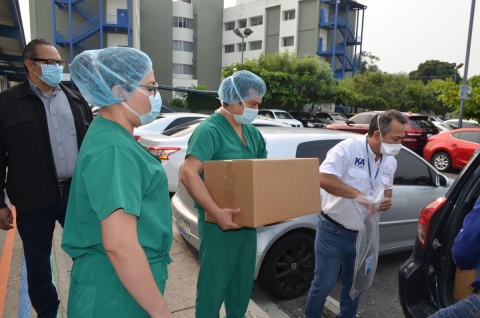
Authorities in El Salvador have fired an official and launched a probe into government contracts awarded during the COVID-19 pandemic after a report by a journalist on an ICFJ program. Her reporting showed that the government bought face shields from that official’s family company -- and at inflated prices.
After veteran Salvadoran reporter Cecibel Romero broke the story about the deal and then about the inflated prices, the government fired the official. The attorney general also has opened an investigation into contracts awarded during the COVID-19 pandemic, authorizing raids on 13 governmental offices in search of proof of irregularities.
The reports were published by Salud con Lupa, an independent news site founded by ICFJ Knight Fellow Fabiola Torres. Romero was part of the Lupa Fellowships, which provided financial and editorial support to journalists across Latin America to produce in-depth, data-enhanced stories. Lupa Fellows across 10 countries have reported on the impact of COVID-19 on vulnerable communities, engaged young audiences, and exposed corruption.
The Investigation
As the pandemic took hold, Romero decided to look into a government program to use recycled water bottles to make face shields for essential workers. The government had originally distributed the water bottles to the public in an effort to address a shortage of safe drinking water, then promised to recycle them after critics raised environmental concerns.
“It sounded like a happy ending for a story,” Romero said. “‘We took this garbage and turned it into a useful product that now we can give to frontline workers.’”
But she suspected that wasn’t the full story. She decided to look into the government official leading the process: Jorge Aguilar, president of El Salvador’s Environmental Fund and a well-known business person in the recycling industry.
Despite a government suspension on public information requests, Romero obtained a series of official reports submitted to the country’s legislature on vendors, prices and products related to the face shields. She learned that face shields purchased by the government were made by Insema, Aguilar’s family company.
According to lawyers Romero interviewed, Aguilar had probably violated not just the public purchases law but also the government ethics law, which mandates that members of the administration can’t participate in matters that may pose a conflict of interest. Aguilar later acknowledged the contract, but said at the time it was awarded his daughter was in charge of the company, not him.
Romero’s original report spurred other journalists to begin their own investigations. One of them found the purchase order that showed quantities and prices for the face shields purchased by the government. Romero examined these documents and reported that the protective equipment had been acquired at a 121 percent markup per unit.
Just getting this documentation was a feat. “The Salvadoran government has restricted access to public contracts to prevent citizen oversight,” said Torres, the ICFJ Knight Fellow who founded Salud con Lupa. “It has made the work of investigative journalists harder, and even more important.”
Despite the challenges, Romero and other Lupa Fellows decided early on they would dig into government spending related to the pandemic. “From the beginning it was clear that the pandemic showed everything that was wrong in our countries, especially with the health systems,” Romero said. And her efforts clearly paid off for the public.
Photo courtesy of Salud con Lupa